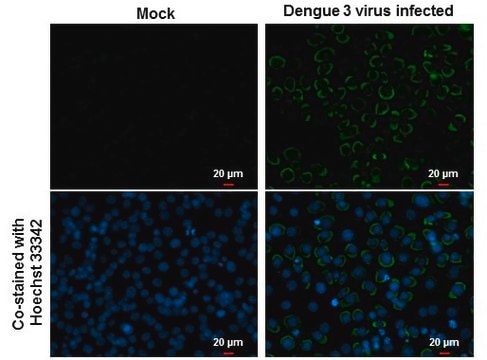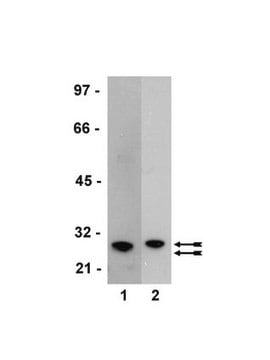MAB8703
Anti-Dengue Virus Type III Antibody, clone 5D4-11
clone 5D4-11, Chemicon®, from mouse
Sign Into View Organizational & Contract Pricing
All Photos(1)
About This Item
UNSPSC Code:
12352203
eCl@ss:
32160702
NACRES:
NA.41
Recommended Products
biological source
mouse
Quality Level
antibody form
purified antibody
clone
5D4-11, monoclonal
species reactivity
human
manufacturer/tradename
Chemicon®
technique(s)
immunofluorescence: suitable
isotype
IgG1
shipped in
wet ice
General description
Dengue fever is an acute, mosquito-transmitted viral disease characterized by fever, headache, arthralgia (severe retro-orbital pain), myalgia, rash, nausea, and vomiting. Infections are caused by any of the four closely related, but antigenically distinct virus serotypes (DEN-1, DEN-2, DEN-3, and DEN-4). Infection with one of these serotypes does not provide cross-protective immunity, so persons living in a dengue-endemic area can have four dengue infections during their lifetimes. Dengue is primarily an urban disease of the tropics, and the viruses that cause it are maintained in a cycle that involves humans and Aedes aegypti, a domestic, day-biting mosquito that prefers to feed on humans. Although most dengue infections result in relatively mild illness, some can produce Dengue Hemorrhagic Fever (DHF) or dengue shock syndrome, with children being particularly at risk. Although epidemic outbreaks have been reported since 1779, the incidence has been increasing, with global, multiple serotype pandemics intensifying within the last 15 years. There is no specific antiviral therapy for dengue, but for both classical dengue and dengue hemorrhagic fever, symptomatic and supportive measures are effective. Important risk factors for DHF include the strain and serotype of the virus involved, as well as the age, immune status, and genetic predisposition of the patient.
Specificity
Reacts with the Dengue type 3 virus.
Immunogen
Dengue virus antigens (H87).
Application
Anti-Dengue Virus Type III Antibody, clone 5D4-11 is an antibody against Dengue Virus Type III for use in IF.
Immunofluorescent assay.
Final working dilutions must be determined by end user.
Final working dilutions must be determined by end user.
Research Category
Infectious Diseases
Infectious Diseases
Research Sub Category
Infectious Diseases - Viral
Infectious Diseases - Viral
Physical form
Format: Purified
Purified. 0.02M Phosphate Buffer, pH 7.6, 0.25M NaCl and 0.1% sodium azide.
Storage and Stability
Maintain at 2-8°C in undiluted aliquots for up to 12 months. Avoid repeated freeze/thaw cycles.
Other Notes
Concentration: Please refer to the Certificate of Analysis for the lot-specific concentration.
Legal Information
CHEMICON is a registered trademark of Merck KGaA, Darmstadt, Germany
Disclaimer
Unless otherwise stated in our catalog or other company documentation accompanying the product(s), our products are intended for research use only and are not to be used for any other purpose, which includes but is not limited to, unauthorized commercial uses, in vitro diagnostic uses, ex vivo or in vivo therapeutic uses or any type of consumption or application to humans or animals.
Storage Class Code
10 - Combustible liquids
WGK
WGK 2
Flash Point(F)
Not applicable
Flash Point(C)
Not applicable
Certificates of Analysis (COA)
Search for Certificates of Analysis (COA) by entering the products Lot/Batch Number. Lot and Batch Numbers can be found on a product’s label following the words ‘Lot’ or ‘Batch’.
Already Own This Product?
Find documentation for the products that you have recently purchased in the Document Library.
Zhao Xuan Low et al.
Scientific reports, 11(1), 21221-21221 (2021-10-29)
Dengue is an arthropod-borne viral disease that has become endemic and a global threat in many countries with no effective antiviral drug available currently. This study showed that flavonoids: silymarin and baicalein could inhibit the dengue virus in vitro and
Evaluation by flow cytometry of antibody-dependent enhancement (ADE) of dengue infection by sera from Thai children immunized with a live-attenuated tetravalent dengue vaccine.
Bruno Guy, Pornthep Chanthavanich, Sophie Gimenez, Chukiat Sirivichayakul et al.
Vaccine null
Identification of distinct antigenic determinants on dengue-2 virus using monoclonal antibodies.
Gentry, M K, et al.
The American Journal of Tropical Medicine and Hygiene, 31, 548-555 (1982)
Dengue virus-specific and flavivirus group determinants identified with monoclonal antibodies by indirect immunofluorescence
Henchal, E A, et al
The American Journal of Tropical Medicine and Hygiene, 31, 830-836 (1982)
Our team of scientists has experience in all areas of research including Life Science, Material Science, Chemical Synthesis, Chromatography, Analytical and many others.
Contact Technical Service



